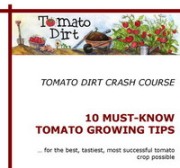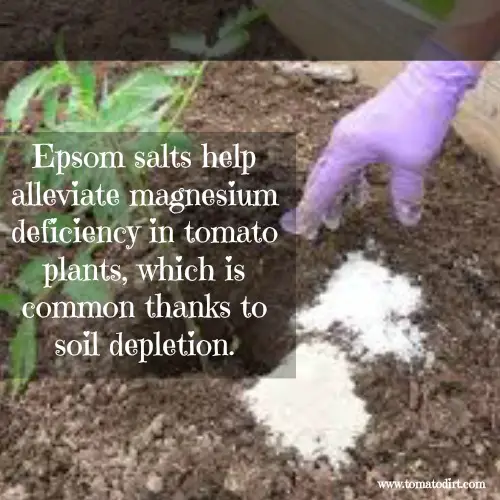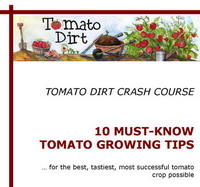FREE: 10 Must-Know Tomato Growing Tips Get The Guide
Read our affiliate disclosure here.
Epsom Salts: a Natural Fertilizer for Tomatoes
Since 2010, Tomato Dirt has garnered 4.8+ million views, making it the web’s leading online source for growing tomatoes in the home garden. Award-winning writer and Tomato Dirt owner Kathy Widenhouse has helped thousands of home gardeners grow healthier tomatoes. Be one of them when you get Tomato Dirt’s Growing Guide here.
Updated 6.10.25
Epsom salts are a naturally-occurring mineral compound considered by many home gardeners to be an excellent fertilizer. The compound has high solubility and is easy to apply as a spray on foliage.
As far as what’s in it, “Epsom salt” not a salt at all. Instead, it is made up of 10% magnesium and 13% sulfur – one reason it’s also referred to as magnesium sulfate.
First produced in a salty spring in the southeastern English
village of Epsom
in Surrey, today the compound is readily
available in discount department stores, garden centers, hardware stores, and pharmacies.
You can also buy Epsom salts easily and quickly online, as in here. Or check out a variety of Epsom salts products and choose one that fits your situation.
When not confiscated by gardeners to as a fertilizer boost in the garden, the product is used as a foot soak, face cleaner, hair cleaner, and relaxing bath salts.
Why tomato plants need magnesium
In plants, magnesium helps with seed germination, chlorophyll production, fruit development, strengthening cell walls, and improving uptake of nitrogen, phosphorus, and sulfur.
Why tomato plants need sulfur
Sulfur helps produce vitamins, amino acids, and enzymes.
How Epsom salts can help tomatoes
Most tomatoes don’t lack sulfur, but many suffer from magnesium deficiency (usually due to soil depletion.) Applying the salts alleviates the deficiency. Spraying on the compound is reputed to work within 48 hours, but the soil does also need to be amended as a long-term fix.
How do you know if your tomato plants have a magnesium deficiency?
Some tip offs …
- Leaves turn yellow
- Leaves turn yellow in between the veins (interveinal chlorosis)
- Leaves curl
- Plants become spindly
- Fruit production decreases
- A soil test reveals a magnesium deficiency
How to apply Epsom salts
When planting tomatoes: add 1 tablespoon to planting hole and work into the soil before planting tomato seedlings.
Early to mid-season: using a tank sprayer, combine salts in a gallon of water. Use 2 tablespoons salts per gallon when applying once a month; 1 tablespoon per gallon if you apply more than once a month. Early and mid-season applications encourage plant growth and prevent blossom end rot.
Late in the season: apply as a spray to increase fruit yield and keep plants green and healthy.
As a side dressing: work in 1 tablespoon per 1 foot of plant height into the soil around the base of the plant every six weeks. Granular application impacts the plant more slowly than foliar application, but produces the same benefits. Be advised that as much as 49% of granular applications have been recorded to leach out of the soil before they’re absorbed by the plant.
Advantages to using the salts
- It’s inexpensive
- It dissolves easily
- It’s quick-acting
- It offers a green alternative to chemical fertilizers
Disadvantages to using them
Unabsorbed salts can wash into the groundwater, streams, and lake
Be careful about this
Depleted soils are the most susceptible to magnesium deficiency. Also susceptible are soils high in calcium and potassium, and soils with a pH higher than 7.0. Calcium and potassium compete with magnesium for uptake in tomato plants … and magnesium often loses.
But use the salts in moderation. If you treat your tomato plants with excess Epsom salts when the soil is low in calcium, you risk excess blossom end rot. Calcium and magnesium compete for uptake – and blossom end rot is a condition associated with blighted calcium uptake, which could be induced by too much magnesium.
More on fertilizing tomatoes
Fertilizing Tomatoes: Frequently Asked Questions ...
What Nutrients Do Tomatoes Need?
What’s the Best Tomato Fertilizing Schedule?
How to use tomato fertilizer to get the best production ...
Kinds of tomato fertilizer ...
Organic tomato fertilizer: advantages and disadvantages ...
Does tomato fertilizer stay potent over time?
Will this tomato fertilizer work for you?
Get more ideas on our Fertilizing Tomatoes Pinterest board...
Return from Epsom Salts: a Natural Fertilizer for Tomatoes
As an Amazon Associate and Rakuten Advertising affiliate I earn from qualifying purchases.
SHARE THIS PAGE:
FREE! 10 Must-Know Tomato Growing Tips: 20-page guide
Get yours here:









New! Comments
Have your say about what you just read! Leave a comment in the box below.